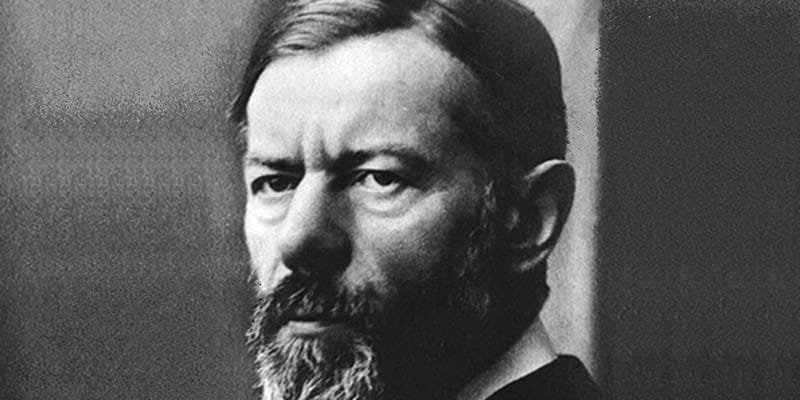Max Weber biografie en boeken

Max Weber was een Duitse socioloog, filosoof en wetenschapstheoreticus. Naast zijn belangrijke bijdragen aan de moderne sociologie is Max Weber ook bekend geworden vanwege zijn wetenschappelijke managementbenadering van bureaucratie en zijn bureaucratie theorie en zijn basistheorie achter sociaal handelen.
Max Weber biografie
In 1882 meldde Max Weber zich aan bij de Universiteit van Heidelberg. Als junior jurist studeerde hij ook voor notaris en slaagde in 1886 voor zijn examen. In 1889 behaalde hij zijn doctoraat met zijn proefschrift over de rechtsgeschiedenis.
Na zijn rechtenstudie werd Max Weber benoemd tot docent aan de universiteit van Berlijn en in deze rol was hij tevens adviseur van de regering. Daarnaast had hij een bijzondere belangstelling voor modern sociaal beleid.
Tussen 1888 en 1890 werd Max Weber lid van de Verein für Socialpolitik waar hij empirisch economisch onderzoek (statistische onderzoeken) verrichtte met het doel een oplossing te vinden voor de sociale problemen van die tijd. Bekende theorieën van hem war toen de bureaucratie theorie en zijn theorie over sociaal handelen
In 1890 had Max Weber de leiding over een onderzoek naar de grote instroom van Poolse migranten. De eindresultaten van dit onderzoek werden alom geprezen en dit betekende voor Max Weber het begin van zijn carrière als befaamd sociaal wetenschapper.
In 1893 werd Max Weber lid van de Alldeutscher Verband (Pan-Duitse Liga) en gaf provocerende lezingen waarin hij de immigratie van Poolse mensen bekritiseerde.
In 1894 verhuisde Max Weber naar Freiburg waar hij benoemd werd tot hoogleraar economie aan de universiteit van Freiburg. In die periode was zijn onderzoek nog steeds gericht op economie en rechtsgeschiedenis.
In 1899 moest hij zijn werkzaamheden als professor opgeven omdat hij aan depressies en slapeloosheid leed. Tijdens de onderbreking van zijn werkzaamheden, die tot 1902 duurde, reisde hij door Italië.
Hij probeerde daarna zijn hoogleraarschap op te pakken maar in 1903 moest hij zich vanwege een psychische aandoening weer terugtrekken. Pas in 1919 was hij voldoende hersteld om zijn werk te hervatten en keerde hij terug als hoogleraar aan de Universiteit van München.
In deze periode schreef hij belangrijke werken zoals Algemene Economische Geschiedenis, Wetenschap als Beroep en Politiek als Beroep. Dit leidde tot veel commotie omdat veel collega’s en studenten het niet eens waren met zijn standpunten en uitspraken over de Duitse Revolutie.
In 1920 stierf Max Weber stierf aan de gevolgen van longontsteking. Hij wordt naast Karl Marx en Émile Durkheim beschouwd als de ‘vader’ van de moderne sociologie.
Max Weber quotes
- “A science which attempts the interpretive understanding of social action in order thereby to arrive at a causal explanation of its course and effects.”
- “Power is the chance to impose your will within a social context, even when opposed and regardless of the integrity of that chance.”
- “Culture is a finite segment of the meaningless infinity of the world process, a segment on which human beings confer meaning and significance.”
- “The ethic of conviction and the ethic of responsibility are not opposites. They are complementary to one another.”
- “It is not true that good can only follow from good and evil only from evil, but that often the opposite is true.”
- “Laws are important and valuable in the exact natural sciences, in the measure that those sciences are universally valid.”
- “Every type of purely direct concrete description bears the mark of artistic portrayal.”
- “The fully developed bureaucratic apparatus compares with other organisations exactly as does the machine with the non-mechanical modes of production.”
- “All the analysis of infinite reality which the finite human mind can conduct rests on the tacit assumption that only a finite portion of this reality constitutes the object of scientific investigation, and that only it is important in the sense of being worthy of being known.”
- “Politics means striving to share power or striving to influence the distribution of power, either among states or among groups within a state.”
- “The primary task of a useful teacher is to teach his students to recognize ‘inconvenient’ facts – I mean facts that are inconvenient for their party opinions.”
- “No sociologist should think himself too good, even in his old age, to make tens of thousands of quite trivial computations in his head and perhaps for months at a time.”
- “Causal analysis provides absolutely no value judgment, and a value judgment is absolutely not a causal explanation.”
Boeken en publicaties
- 2015, 1919. Politics as a Vocation.
- 2009. From Max Weber: essays in sociology. Routledge.
- 2009. The theory of social and economic organization. Simon and Schuster.
- 2002. The Protestant ethic and the spirit of capitalism and other writings. Penguin.
- 1994. Weber: political writings. Cambridge University Press.
- 1981. General economic history. Transaction publishers.
- 1978. Economy and society: An outline of interpretive sociology. Univ of California Press.
- 1968. On charisma and institution building. University of Chicago Press.
- 1968, 1953. The Religion of China, Confucianism and Taoism.
- 1958. Science as a Vocation. Daedalus, 87(1), 111-134.
- 1958. The Three Types of Legitimate Rule. Essay
- 1946. Science as a Vocation. In Science and the Quest for Reality (pp. 382-394). Palgrave Macmillan UK.
- 1946. Class, status, party (pp. 180-95). na.
- 1930, 1905. The Protestant Ethic and the Spirit of Capitalism, Translated by Talcott Parsons… with a Foreword by RT Tawney.
- 1924. Gesammelte aufsätze zur soziologie und sozialpolitik.
Citatie voor dit artikel:
Van Vliet, V. (2017). Max Weber. Retrieved [insert date] from Toolshero: https://www.toolshero.nl/bekende-auteurs/max-weber/
Oorspronkelijke publicatiedatum: 12/10/2017 | Laatste update: 09/10/2023
Wilt u linken naar dit artikel, dat kan!
<a href=”https://www.toolshero.nl/bekende-auteurs/max-weber/”>Toolshero: Max Weber</a>












